|
|
|
Sort Order |
|
|
|
Items / Page
|
|
|
|
|
|
|
| Srl | Item |
| 1 |
ID:
141335
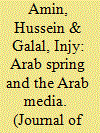

|
|
|
| 2 |
ID:
182475
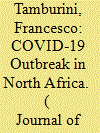

|
|
|
|
|
| Summary/Abstract |
North African nations, especially Egypt, Algeria, and Morocco, have been heavily affected by COVID-19 if compared to other African countries. Governments in North Africa took proactive legal measures to manage the virus threat, safeguarding population health, but also triggering repressive and invasive mechanisms that in some cases jeopardized basic freedoms and rights. This work will analyze comparatively the anti-COVID-19 legislations, pointing out how the legislative measures mirrored the level of transition of democracy, the opacity of some regimes, exploitation of the pandemic to foster repressive control, and highlighting the weakness of new democratic institutions unprepared to balance health security and democracy.
|
|
|
|
|
|
|
|
|
|
|
|
|
|
|
|
| 3 |
ID:
185143
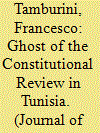

|
|
|
|
|
| Summary/Abstract |
The existence of a constitutional control is the essential cornerstone in any democratic system. Without a constitutional justice it is impossible to maintain a pluralist democracy with a real rule of law. The Tunisian constitutional history is emblematic of the relevance of the constitutional review. This article outlines the difficult and hampered life of the Tunisian constitutional justice that crossed two authoritarian regimes: a “revolution”; and the transition to democracy. It is in the latter phase that the creation of the constitutional court proved to be the paramount element in the passage from a procedural democracy to a substantive democracy.
|
|
|
|
|
|
|
|
|
|
|
|
|
|
|
|
| 4 |
ID:
193022


|
|
|
|
|
| Summary/Abstract |
The president of Tunisia, Kais Saied, recurred to Article 80 of the constitution on 25 July 2021 to proclaim the “state of exception,” freezing parliamentary activities, removing the representatives’ immunity, and dissolving the government headed by Prime Minister Hichem Mechichi. The following presidential decree 2021-117 on 22 September granted him legislative powers by decree, dismantling the constitution of 2014, which was the cornerstone of the result of the “Jasmine Revolution” of 2011. This article will analyze the constitutionality of the presidential decrees and shed light on the juridical, socioeconomical, and political circumstances that allowed Saied to perform what can be described as a constitutional coup or a self-coup, which reshaped the future of Tunisia.
|
|
|
|
|
|
|
|
|
|
|
|
|
|
|
|
| 5 |
ID:
163280
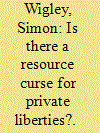

|
|
|
|
|
| Summary/Abstract |
Scholarship on the political resource curse overwhelmingly focuses on whether oil wealth hinders the transition to democracy. In this note, I examine whether it oil wealth negatively affects the private rights of the individual. I argue that petroleum-rich governments are subject to less pressure to protect freedom of movement, freedom of religion, the right to property, and freedom from forced labor. In addition, they can use the windfall at their disposal to finance the enforcement of laws that restrict those rights. Based on a panel of 162 countries for the years 1932–2003, I find that petroleum wealth is negatively associated with private liberties. Using mediation analysis, I also find that most of the impact of oil wealth on private rights arises independently of its impact on the level of democracy. This indicates that the scope of the political resource curse extends beyond representation.
|
|
|
|
|
|
|
|
|
|
|
|
|
|
|
|
| 6 |
ID:
168248
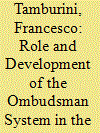

|
|
|
|
|
| Summary/Abstract |
The institution of the Ombudsman is aimed at defending values such as human rights and the respect for the rule of law against any form of abuse or arbitrariness. Many academic studies have been devoted to the Ombudsman in its different developments around the world, but not to the Maghreb area. This article wants to shed light on the characteristics of the Ombudsman in Algeria, Mauritania, Morocco and Tunisia. The comparative exam of the different North African Ombudsmen will point out how the institution was able to survive only in states where a transition to democracy was truly in place.
|
|
|
|
|
|
|
|
|
|
|
|
|
|
|
|
| 7 |
ID:
180690
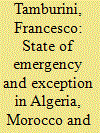

|
|
|
|
|
| Summary/Abstract |
This paper shows how the constitutional provisions related to the state of emergency and exception, although they are contained within democratic traditions, were set to operate in Algeria, Morocco and Tunisia as a mechanism of basic control and maintenance of liberal autocracies. The state of emergency model was used for the survival of regimes in times of instability and social unrest, leading in some cases to the suspension of human rights for many years. Nevertheless, these provisions were modified or lifted when the regime had to show a more convincing stake to the democratic process in 2011.
|
|
|
|
|
|
|
|
|
|
|
|
|
|
|
|
|
|
|
|
|